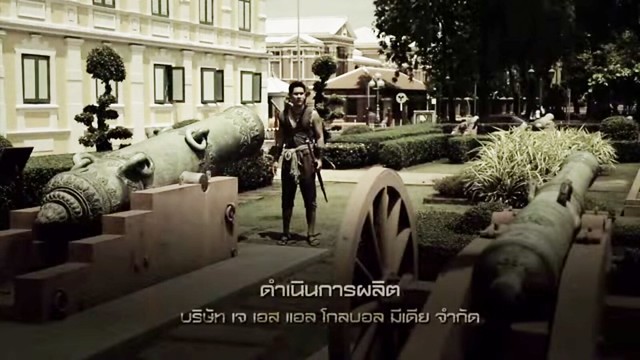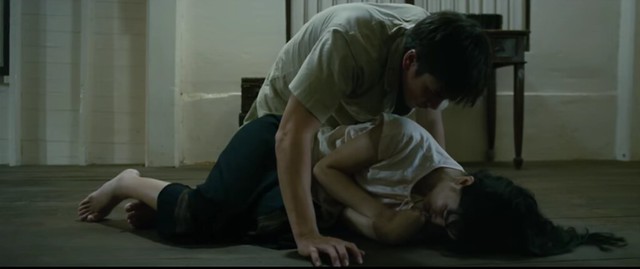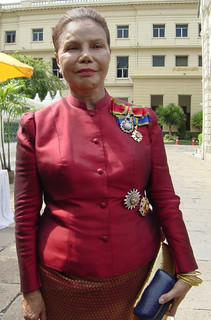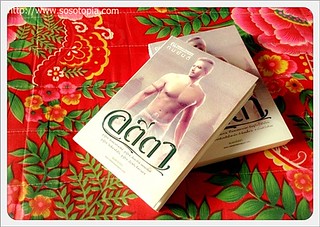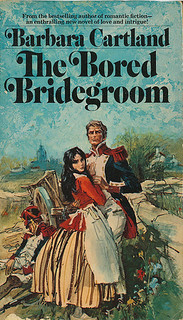A time-traveling romantic soap opera surrounding the events of Bang Rachan, based on a novel written by a right-wing author, colours the imagined past through rosy, blood-tinted glasses.
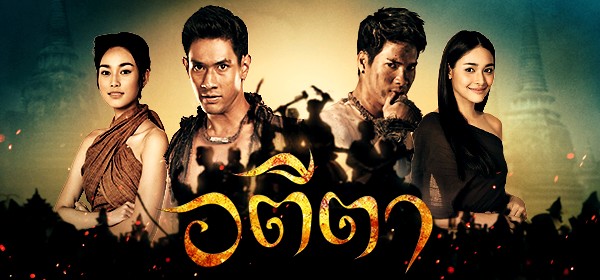
“Atitha” (“The Ancient Past”) is currently airing on Channel 7, at 20:30 on Fridays to Sundays. This time-travelling period romance featuring Ayutthayans and Burmese fighting in the Bang Rachan siege has been made into soap operas (lakorn) twice, the first in 2001. The original two-novel series was first serialized in 1992 by Thommayanti, the pen name of Wimon Chiamcharoen (1937–).
The Bang Rachan myth, of a village single-handedly holding off Burmese forces during the Burmese Siamese War (1765-1767) before being overwhelmed, has often been remade as part of popular modern Thai mythology: a 1966 version was made, while the 2000 version directed by Thanit Jitnukul is the best known. The Bang Rachan myth popularizes nationalism, sacrifice, and Thai-Burmese enmity as both natural and necessary, disregarding historical inaccuracies such as the
non-existence of “Thailand/Siam” or “Burma” at the time. Instead, the wars were between the kingdoms of “Ayutthaya” and the “Konbaung.”
However, Atitha takes it a step further than these historical movies, by adding romantic and time-traveling events to literally connect present-day Thailand with Ayutthaya and conjure up a continuous, imagined past.
From left to right, the members of the love square: Kalong in the Ayutthaya period, reincarnated as Latika in the modern (Fonthip Watcharatrakul), Mueangjai (Akkaphan Namart), Sirot (Pattaradet Sa-nguankwamdee), and Chankapho (Tisanart Sornsuek) (Source)
The plot is as follows: Sirot (Pattaradet Sa-nguankwamdee), a “foreign educated” event organizer returns from studying abroad, and sets to work organizing a flashy, modern, “youth-attracting” event for the Ayutthaya Lights and Music Festival, often butting heads with some “old-fashioned” colleagues. Then somehow, a warrior named Mueangjai (Akkaphan Namart) from Bang Rachan accidentally travels from the 18th century to the present day while looking for cannons to reinforce his village against attacks. Sirot ends up travelling back in time to aid Mueangjai in the Bang Rachan siege, and both men fall in love with the women they meet in the eras they travel to.
Of course, Sirot knows that the Bang Rachan siege will ultimately fail, but he still continues to help his friends and fight patriotically, albeit for a nation that doesn’t exist yet. By fighting in an iconic battle, falling in love with a maiden from the past, and experiencing nostalgia for “simple” village romance and pure ideals, by the end Sirot has completely reformed from his former “modernizing” self.
Mueangjai in modern-day Bangkok, looking for cannons at the Ministry of Defence (Opening titles)
Of course, “Atitha” raises several issues. The airing this sort of historically inaccurate, simplistic story about the Burmese “ravaging, murdering, and pillaging” (according to the first episode’s opening
crawl) has caused debate in the Thai online world about whether it is appropriate, now that Thailand is part of ASEAN. An online
forum topic about whether nationalistic films and lakorn featuring Burmese enemies create anti-Burmese sentiment has comments ranging from “No, I don’t hate Burmese, since it’s part of the past” to “We need nationalism more than ever, so that we can be superior to others in the AEC. People who think differently are naive.”
Kobori raping Angsumalin the 2013 movie version of Khu Kam (Source)
Glorifying war and solidifying an imagined past with the glory days of a lost empire through romance and time travelling is actually a trademark of the author of the novel, Wimon Chiamcharoen. Wimon, a prolific writer with multiple pen names, has written numerous romantic novels that have been constantly and repeatedly adapted to the screen, including Khu Kam (lit. “Karma Couple”, English title Sunset at Chaophraya, a World War II romance between a Japanese soldier and a Thai woman that includes rape) and Tawee Pope (another time-traveling romance between a modern-day woman and a man in the reign of Rama V). Interestingly, Wimon shows favouritism when it comes to portraying foreigners in her novels: the Burmese are the barbaric, evil enemies in Atitha, but the WWII Japanese soldier who rapes is a dashing hero.
Left: Wimon Chiamcharoen, far-right romantic novelist (Source)
Right: Shirtless Bang Rachan warriors on a cover of Atitha (Source)
In addition to her novels, Wimon is known for her intimate relationship with the military and her political power as a result of that special bond. In the Thammasat Massacre on 6 October 1976, Wimon was instrumental in mobilizing the “Housewife Society,” a group of the wives of civil servants and generals against the protesting students. Wimon also made various speeches supporting the military and denouncing the students for potentially damaging the country’s relationship with the US. After the students were massacred and the junta took control, Wimon was appointed as a legislator in the National Reform Council in 1977, a senator in 1979, and even as a director of the BMTA in 1984.
Left: Wimon is like a Thai Barbara Cartland...but with a dangerous political edge (Source)
Right: Not familiar with her books? See this review (Source)
Wimon, with her Khun Ying title, can be seen as a Thai Barbara Cartland: loaded ladies who write too many old-fashioned romances. Thailand’s Cartland, however, has a blood-soaked, Jurassic, political edge to her stories. Continuing remakes of “Atitha” and her other novels may literally take us backwards in time in terms of very, very basic progressiveness, such as “not loving the man who rapes you”, “not hating Burmese people” or even “not rushing headlong to death just because someone else says so.”


